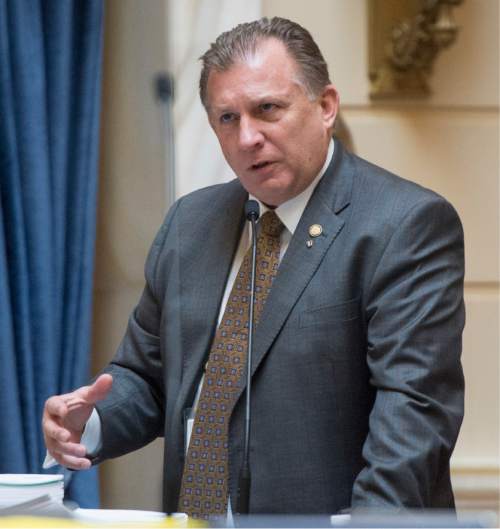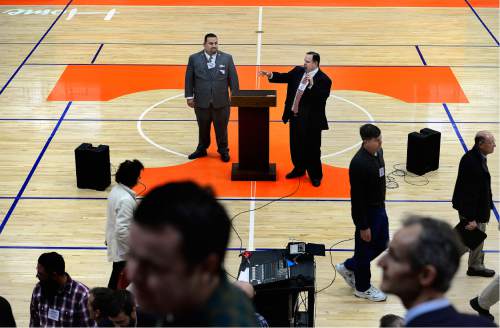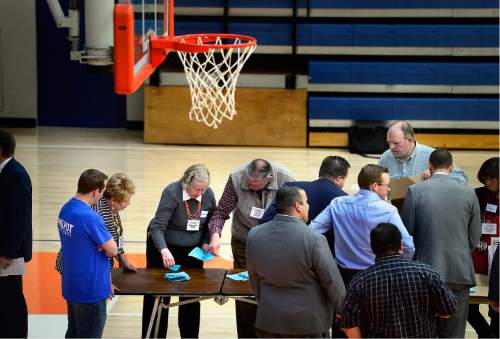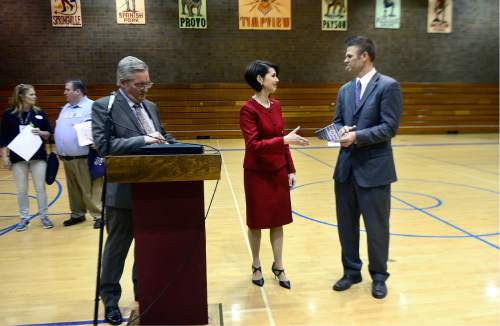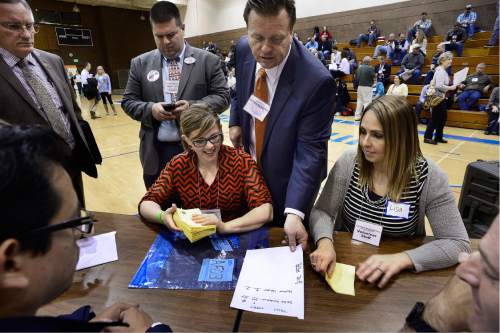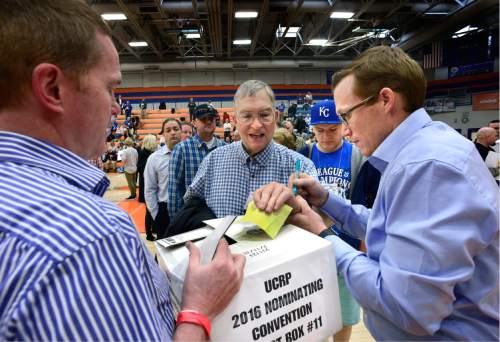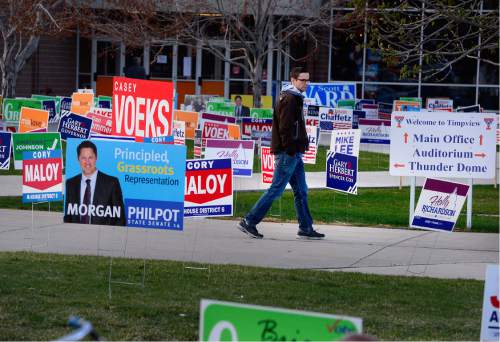This is an archived article that was published on sltrib.com in 2016, and information in the article may be outdated. It is provided only for personal research purposes and may not be reprinted.
Provo • Delegates and candidates at the Utah County Republican Convention were still raging Saturday against changes to state election law that let candidates circumvent the convention process and gather signatures to get on the ballot.
And that wasn't the only thing upsetting the delegates Saturday. At one point, they booed their top incumbent — Gov. Gary Herbert.
In the case of the election law, a federal judge ruled Friday the law is constitutional and Utah County Republican Chairman Craig Frank said party members will abide by the law, but they won't like it, and candidates who take the signature-gathering path to the ballot shouldn't count on the party for any help.
"We will support, with our resources, those people who become our nominees" through the convention, Frank said. "According to our bylaws, [signature-gathering candidates] will not be entitled to resources from the party, boots on the ground, additional lists and any additional Republican information that the party has in its possession."
Utah County, perhaps more than other counties, dug in its heels and fought the election law changes in SB54, which the Legislature passed in 2014. So far, the law has withstood a withering legal assault from the state Republican Party and it appears it will remain in effect after U.S. District Judge David Nuffer ruled against the party's last remaining challenge Friday evening and declared the law to be constitutional.
But some candidates who gathered signatures, including Herbert, were on the defensive as they spoke to the county delegates Saturday.
"Governor Herbert signed into law the disastrous SB54, the Count My Vote bill," said Nate Jensen, one of three Republicans challenging the governor this year, referring to the group of Utah politicos who pushed for a ballot initiative to get rid of the conventions and replace them with primary elections. The initiative was dropped in favor of the compromise bill passed by the Legislature.
"Count My Vote screwed up the Utah caucus system, it took power away from delegates and it was a bad thing," Jensen said to cheers and several shouts of "Amen!" from the audience.
Herbert was also shouted down and booed by delegates when he tried to fend off criticism from Jensen and fellow challenger Jonathan Johnson that Herbert let the state adopt federal Common Core educational standards.
Herbert tried to explain that the standards are set by the state Board of Education and his opponents are trying to turn the standards into a "boogeyman," but was drowned out by loud jeers from delegates.
Dan Hemmert admitted to delegates in Senate District 14 that he gathered signatures, but questioned why there was so much animosity toward candidates who took that route.
"As recently as this week, the party told me they were going to kick me out," Hemmert said. "So [Donald] Trump can be in the party, but a guy who served 18 years as a precinct official and delegate will get kicked out?"
Hemmert said afterward there is a small but extremely vocal group of maybe 20 percent of the delegates who are upset with any candidate who gathered signatures.
"I think it was a big deal in my race," he said.
Hemmert made it through convention and will face off in a June primary with former Rep. Morgan Philpot, who took a swipe at Hemmert and the other candidate in the race, former Rep. Holly Richardson, for gathering signatures. Richardson was eliminated.
"Only one candidate has left, in this entire process, his fate in your hands, and that's me," Philpot said, urging the delegates to "send a senator to the [Capitol] who will stand unequivocally for this process and seek to overturn a bad bill."
Sen. Curt Bramble, R-Provo and the sponsor of SB54, said it was not a bad bill.
If it were not for the compromise legislation, Bramble said, Count My Vote would almost certainly have succeeded in getting an initiative on the 2014 ballot and, had it passed, conventions would have been eliminated in favor of open primaries.
"Without Senate Bill 54, there would be no caucus-convention pathway to the ballot," Bramble said. "It's incumbent on the party now, with Senate Bill 54 being ruled constitutional, now the party needs to step up its game and make the caucus-convention candidate and the party's endorsement the gold standard, so candidates will work hard to earn that endorsement from the party."
On Saturday, two candidates — incumbent Reps. Brian Greene and Marc Roberts — won the party's endorsement by wide margins at the convention, but each will still face a primary in June against an opponent who gathered signatures. Greene will go against Xani Haynie, whom he beat soundly at the convention, but collected enough signatures. Roberts will face Payson Mayor Richard Moore, who also gathered enough signatures.
Sen. Deidre Henderson, R-Spanish Fork, who had been denied access to delegate lists for more than a week because she had not signed the party's "fitness" pledge, trounced her opponent, 240-9 to win the Republican nomination. Among other things, the pledge required candidates, if nominated, to vow not to support non-Republican hopefuls in other contests.
Also at the convention Saturday, Rep. Jason Chaffetz told delegates that Democratic presidential front-runner Hillary Clinton should be "disqualified" from consideration for president because she mishandled the response to the attack on the U.S. diplomatic compound in Benghazi, Libya.
gehrke@sltrib.com Twitter: @RobertGehrke —
Incumbents ousted
Two state legislators lost out at the Salt Lake County Republican Convention. › B1


